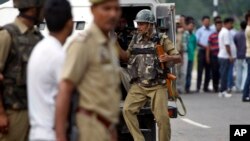NEW DELHI —
At least eight people have been killed in separate attacks on a police and army post in Indian Kashmir. Indian authorities say a meeting of Pakistani and Indian leaders at the U.N. General Assembly in New York will go forward despite the violence by suspected militants.
Jammu police chief Rajesh Kumar said three to four militants came in an auto rickshaw early Thursday and attacked a police station in Kathua district in Jammu. The police post lies close to India’s border with Pakistan.
According to Kumar, the militants killed the police guard, then entered the police post and sprayed bullets. He said they were dressed in army uniforms.
The militants then attacked a nearby army base in Samba district sparking a gun battle that lasted several hours.
An army officer, soldiers, policemen and civilians died in the two attacks. Several others were wounded.
The militants mounted the attacks three days before Indian and Pakistani leaders are expected to meet on the sidelines of the United Nations General Assembly in New York.
In India, the attack immediately led to calls by the political opposition for canceling the meeting.
But Indian Prime Minister Manmohan Singh, who was en route to the United States, said in a statement that such attacks will not succeed in derailing efforts to find a resolution to all problems through a process of dialogue.
He called the violence “one more in a series of provocations and barbaric actions by the enemies of peace.”
In New Delhi, Junior Home Minister R.P.N. Singh said the Prime Minister is committed to bringing about peace between the two countries. He said he will raise “hard questions” with Pakistan, but the dialogue will happen.
“It is extremely unfortunate," Singh said. "Whenever we see that there is going to be a peace talk between India and Pakistan, these kind of incidents always happen just before talks happen. It seems as if somebody or some hand is trying to derail the peace process between India and Pakistan. It is something to vitiate the atmosphere before the talks.”
The commitment to talks was backed by the Chief Minister of Indian Kashmir, the region that lies at the heart of the rivalry between the two countries. Omar Abdullah also underlined the need to persevere with a dialogue with Pakistan.
“We do know that from time to time forces inimical to dialogue have sought to derail this process even though the Pakistani government has thrown its weight behind such a process," he said, "to suggest that this was an attack that was undertaken with the knowledge of the elected leadership of Pakistan, I have no way of suggesting that might be a fact.”
The meeting between the leaders of the two rival nations is being seen as an effort to ease tensions that have spiked after a series of clashes along their Kashmir border this year. Those clashes have raised tempers in New Delhi and revived accusations that Islamabad continues to support militants battling Indian forces in Kashmir.
Pakistani Prime Minister Nawaz Sharif has said he is committed to peace with India. But many in New Delhi believe his efforts are not backed by the army.




